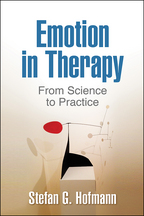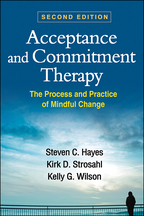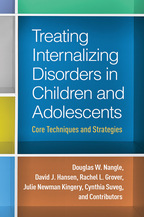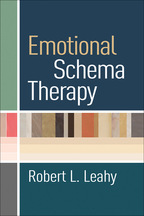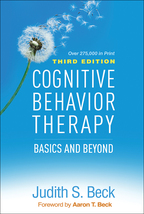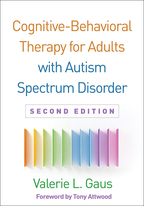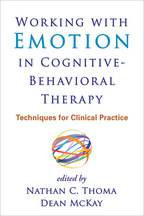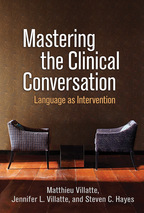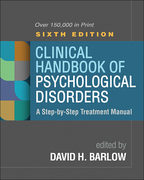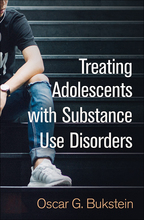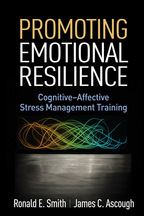Emotion in Therapy
From Science to Practice
Stefan G. Hofmann
Foreword by Steven C. Hayes
Hardcovere-bookprint + e-book
Hardcover
orderDecember 22, 2015
ISBN 9781462524488
Price: $43.00 202 Pages
Size: 6" x 9"
The reproducible materials can be downloaded and printed in PDF format.
“This volume offers a truly unique concise introduction into a wide range of current topics in affective science that are then translated into clinically relevant applications. Hofmann’s remarkable ability to translate theory and make it accessible shines throughout the book. I particularly enjoyed his golfing analogies used to discuss Frijda’s (1988) general laws of emotions. His style is witty and entertaining when discussing these potentially dry theoretical constructs, but turns into a clear and compassionate voice when proposing ways in which these findings can be implemented to benefit clients in clinical practice….The book, I am sure, will soon be featured on essential reading lists of postgraduate clinical training courses around the globe….It is an exemplary demonstration of how findings from basic science through to clinical research trials can be made relevant in real-life clinical practice beyond academic publishing.”

—PsycCRITIQUES
“Hofmann…provides a useful and nuanced review of emotional life….Recommended. Graduate students, researchers, faculty, professionals.”

—Choice Reviews
“This outstanding volume covers diverse areas related to emotions in therapy, including biology and neuroscience, social and personality psychology, motivation, and recent mindfulness meditation strategies. The author also gives concrete recommendations and tools for targeting emotions in clinical practice.”

—Aaron T. Beck, MD, University Professor Emeritus of Psychiatry, Perelman School of Medicine, University of Pennsylvania
“Hofmann is a leading thinker in the field of cognitive-behavioral therapy. He does an excellent job of synthesizing findings from psychology and brain sciences to help better understand how the concept of emotion fits into the therapeutic process. I learned a great deal from this book.”

—Joseph E. LeDoux, PhD, Center for Neural Science and Department of Psychology, New York University
“The book illustrates how affective science can be translated into clinical practice, homing in on techniques that are useful for treatment of a variety of emotional problems. The many 'In Practice' features will be of particular interest to clinicians, as they provide a veritable bounty of practical information. The summaries of clinically relevant points at the end of each chapter also provide useful guideposts. Clinicians will find this book both accessible and useful—a winning combination.”

—Ann M. Kring, PhD, Department of Psychology, University of California, Berkeley
“This volume cogently demonstrates that the time has come for emotion in psychotherapy. If you want a thoughtful translation of multidisciplinary research on emotion into clinical applications, you must read this book. It provides an excellent overview of the field, shows how emotion is a core aspect of the majority of psychological problems, and distills a set of cognitive-behavioral clinical strategies for working with emotion. By integrating work with emotion into a cognitive-behavioral approach, Hofmann makes a wonderful contribution to the trend toward psychotherapy integration. This is a helpful book for clinicians that would serve as a good textbook in any course on psychotherapy or counseling.”

—Leslie S. Greenberg, PhD, Distinguished Research Professor Emeritus of Psychology, York University, Canada
“Contemporary clinical training paradoxically lacks a focus on emotions, even though the vast majority of mental health problems are emotional problems. This excellent book meets the need for a bridge between fundamental emotion research and the clinical field. It will be most helpful for students and clinicians in increasing their understanding of emotions—functional and dysfunctional—which form the essence of human life and are central to most psychopathology.”

—Arnoud Arntz, PhD, Department of Clinical Psychology, University of Amsterdam, The Netherlands
—PsycCRITIQUES
“Hofmann…provides a useful and nuanced review of emotional life….Recommended. Graduate students, researchers, faculty, professionals.”
—Choice Reviews
“This outstanding volume covers diverse areas related to emotions in therapy, including biology and neuroscience, social and personality psychology, motivation, and recent mindfulness meditation strategies. The author also gives concrete recommendations and tools for targeting emotions in clinical practice.”
—Aaron T. Beck, MD, University Professor Emeritus of Psychiatry, Perelman School of Medicine, University of Pennsylvania
“Hofmann is a leading thinker in the field of cognitive-behavioral therapy. He does an excellent job of synthesizing findings from psychology and brain sciences to help better understand how the concept of emotion fits into the therapeutic process. I learned a great deal from this book.”
—Joseph E. LeDoux, PhD, Center for Neural Science and Department of Psychology, New York University
“The book illustrates how affective science can be translated into clinical practice, homing in on techniques that are useful for treatment of a variety of emotional problems. The many 'In Practice' features will be of particular interest to clinicians, as they provide a veritable bounty of practical information. The summaries of clinically relevant points at the end of each chapter also provide useful guideposts. Clinicians will find this book both accessible and useful—a winning combination.”
—Ann M. Kring, PhD, Department of Psychology, University of California, Berkeley
“This volume cogently demonstrates that the time has come for emotion in psychotherapy. If you want a thoughtful translation of multidisciplinary research on emotion into clinical applications, you must read this book. It provides an excellent overview of the field, shows how emotion is a core aspect of the majority of psychological problems, and distills a set of cognitive-behavioral clinical strategies for working with emotion. By integrating work with emotion into a cognitive-behavioral approach, Hofmann makes a wonderful contribution to the trend toward psychotherapy integration. This is a helpful book for clinicians that would serve as a good textbook in any course on psychotherapy or counseling.”
—Leslie S. Greenberg, PhD, Distinguished Research Professor Emeritus of Psychology, York University, Canada
“Contemporary clinical training paradoxically lacks a focus on emotions, even though the vast majority of mental health problems are emotional problems. This excellent book meets the need for a bridge between fundamental emotion research and the clinical field. It will be most helpful for students and clinicians in increasing their understanding of emotions—functional and dysfunctional—which form the essence of human life and are central to most psychopathology.”
—Arnoud Arntz, PhD, Department of Clinical Psychology, University of Amsterdam, The Netherlands

